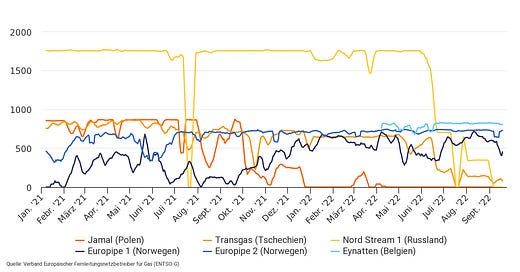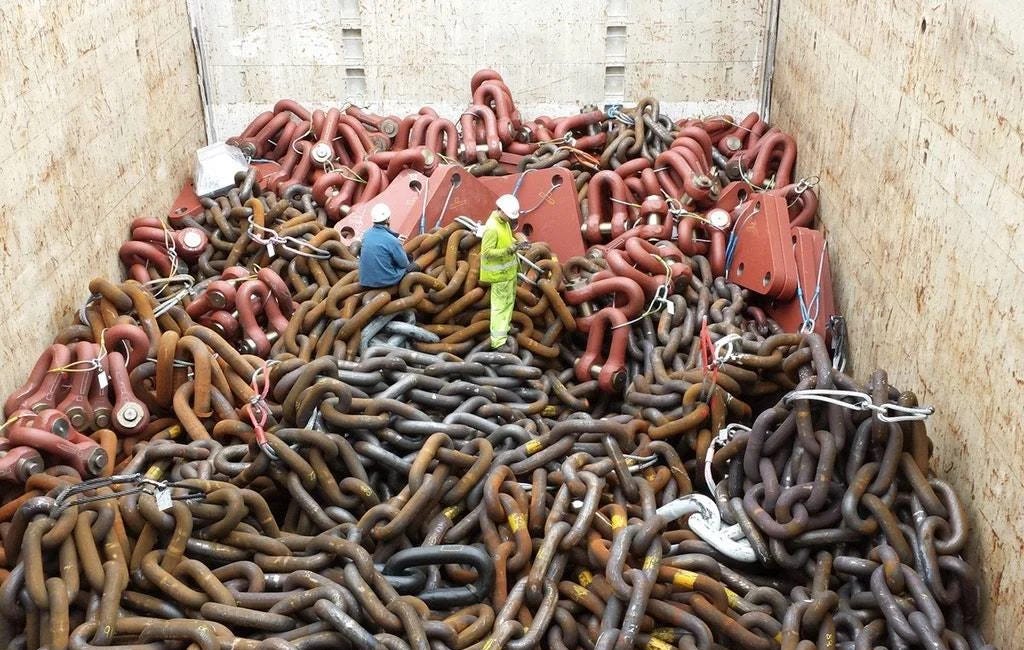Part 5
The following article was written in the week of the 19th-23rd of September 2022. Due to Substack’s publishing limitations, the article is broken down into 6 independent parts.
The events that unfolded in the week after (the 24th-30th of September 2022) made some chart and price data presented here, partially outdated.
The core narrative outlined in the article did not change.
Part 5 - And winter is not even here yet!
Heating homes is seasonal and dependant on weather conditions. Gas for heating (and/or electricity production) during harsh and long winters is in higher demand, of course. It is one of the reasons for gas storage facilities which many countries have. In Germany, under current circumstances, such an increased demand would not be met with the existing supply, and any gas storage would have to be rationed. Currently, Germany’s gas reserves are at almost 90%. Depending on the coming winter, for German and many other modern EU citizens, ‘new’ living conditions are likely en route.
France and Germany are the biggest (nominal) electricity exporters in Europe… or they used to be. Now, both countries have almost stopped electricity exports, compared to their exporting activities from 2020/2021. Also, since the last year, both countries have significantly reduced nuclear power plant operations (i.e., systematically shut down), thus reducing their exporting capacity. It is especially the case with France’s nuclear capacity. So, it comes as no surprise that, gas and coal are used instead more heavily as a substitute, in order to balance out the demand for electricity. As we know by now, gas is in seriously short supply in Europe, which leaves burning coal and wood (pellets) as the main remaining option.
Is it healthy? No.
Is it eco-friendly? No.
Will it help with the EU’s 2030 Climate Target Plan? No.
Who cares?
There are already plans for rationing electricity across the EU member states, with likely blackouts or power outages. France’s grid operator has recently issued a ‘red’ warning level and has cut off certain bigger industrial consumers, with calls to the public to reduce power usage.
Spending Christmas in candlelight, tucked under a blanket or two, will have a new meaning this winter.
With imposed sanctions by the EU, Germany is not the only country feeling the heat… or soon the cold. France, Italy, and Spain, to name but a few, are in dire economic (and political) times as well. The developing crisis in the EU is a major threat to the entire European Union. And the advancing de-globalisation gives the EU’s shaken stability a strong tailwind pushing it to the edge of the political and economic cliff.
Nationalism in the EU reared its ugly head during Covid regarding medical supplies, remember? It is doing that again, so it seems, only this time around, it is regarding energy: The energy nationalism.
Oh, yes, one other thing to mention:
Food for food
Gas is a crucial raw material used for fertiliser production, which is used for food crops, like wheat. The European gas crisis has already turned into a big fertiliser crisis for European agriculture. This is covered more in Part 6.
Again: gas is of cardinal importance for the fertiliser industry. The main gas pipeline from Russia to the EU was the Nord Stream 1, now off-line with no gas flows anymore; see the graph below.
Germany’s economy looks at a cold industrial winter ahead. And so does the EU’s.
Are we trading yet?
Both, the Eurozone (Euro currency states) and the entire EU (all member states) are in trade deficits, importing more than exporting, spending more than earning. See the graph below for the last 18 months, with data from Sept-22. For the Eurozone, the deficit is €34 billion and for the EU €42.3 billion.
Now, let’s zoom out and look at the multi-year overview to get a clearer big picture:
Do you remember the EU sanctions we mentioned earlier and the effects on its socioeconomic wellbeing and on world trade? And how, the high energy costs now make Europe poorer as it must spend a greater portion of its income on importing energy? And the von der Leyen’s annual speech she gave to the EU Parliament on the 14th of September?
Therein, Europe’s response to the war in Ukraine dominated her rhetoric, where she also said:
“So far Team Europe have provided more than 19 billion euros in financial assistance [to Ukraine]. And this is without counting our military support. And we are in it for the long haul.”
Do you now understand the current EU’s economic situation and outlook mainly caused by… the EU’s decision makers?
It is within this context to note that, today, on the 21st of September 2022, Putin announced a partial troops mobilisation, drafting 300,000 reservists into military service, hinting at a major Ukraine war escalation.
-- continue reading Part 6 here:
Chips, oil, and gas - What’s cooking?
Part 6
The following article was written in the week of the 19th-23rd of September 2022. Due to Substack’s publishing limitations, the article is broken down into 6 independent parts. The events that unfolded in the week after (the 24th-30th of September 2022) made some chart and price data presented here, partially outdated.
or
Start over and read from the beginning: Part 1
Chips, oil, and gas - What’s cooking?
The following article was written in the week of the 19th-23rd of September 2022. Due to Substack’s publishing limitations, the article is broken down into 6 independent parts. The events that unfolded in the week after (the 24th-30th of September 2022) made some chart and price data presented here, partially outdated.









